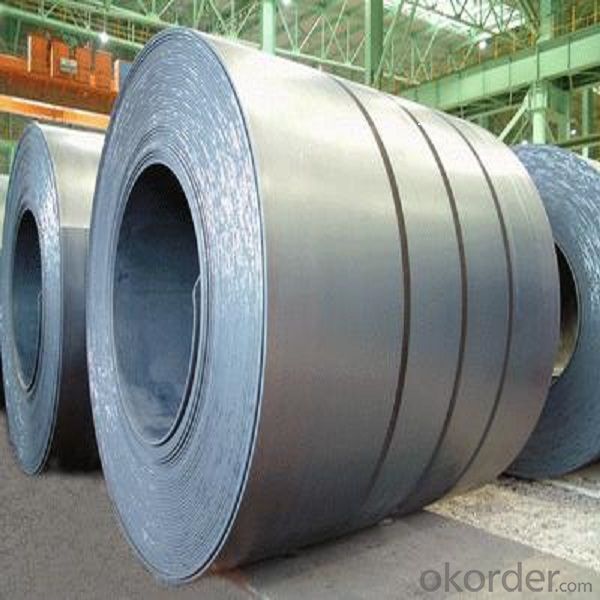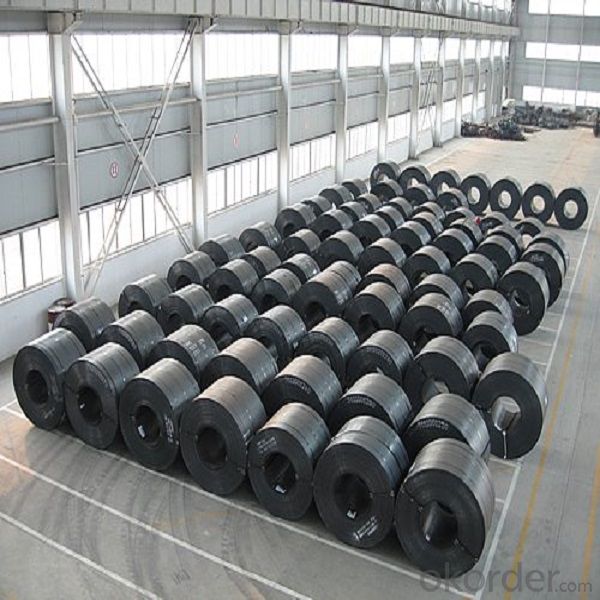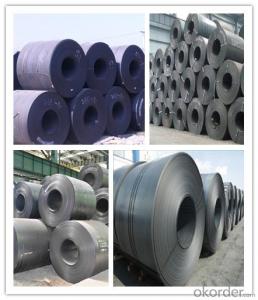Hot Rolled Ship Sheet/Alloy Steel Coil and Plate
- Loading Port:
- China main port
- Payment Terms:
- TT OR LC
- Min Order Qty:
- 23 m.t.
- Supply Capability:
- 50000 m.t./month
OKorder Service Pledge
Quality Product, Order Online Tracking, Timely Delivery
OKorder Financial Service
Credit Rating, Credit Services, Credit Purchasing
You Might Also Like
Item specifice
Standard:
ASTM,GB,DIN,JIS
Technique:
Hot Rolled
Shape:
Round
Surface Treatment:
Oiled,Dry
Steel Grade:
Q195,Q215,Q235,400 Series
Certification:
ISO,SGS,CE
Thickness:
1.8mm-16mm
Width:
1000mm-1600mm
Length:
according to weight
Outer Diameter:
according to weight
Net Weight:
23mt
Packaging:
Standard Export Packing
Product Description:
| Product: | 2mm thickness Q235 grade hot rolled coil |
| Material: | Q195,Q235,A36,SS400,Q345,ST37-2,etc |
| Standard : | JIS G3002 GB/T251B,SS400,DIN |
| Technique: | hot rolled |
| Thickness | 0.1mm to 200mm |
| Tolerance of thickness: | +/-0.03mm |
| Width: | 20mm-2000mm |
| Tolerance of width: | :+/-5.00mm (aiming to +/-2.00mm) |
| Normal width: | 914mm, 1000mm, 1200mm, 1219mm, 1250mm,1500mm |
| Length: | According to requirement |
| Coil ID: | 508mm-610mm |
| Coil Weight: | 4~8 Metric Tons |
| Surface: | Black, Chromate, fingerprint resistant treatment, slight oiled or non-oiled, dry |
| Port of Loading: | Tianjin port |
| Packaging Details: | Standard export packing or according to clients required |
| Delivery Time | within 10 days after receiving 30% deposit |
| Payment Terms: | T/T Or L/C at sight ,Kunlun bank |
Products image:


Why Choose us?
1, ISO, BV, CE, SGS approved
2, Competitive price and quality from our own factory
3, Efficient service team online for 24 hours
4, Smooth production ability(50000tons/month)
5, quick delivery and standard exporting package
6, Flexible payment with T/T, L/C, Paypal, Kunlun bank, etc
- Q:What are the environmental impacts of producing steel coils?
- The production of steel coils has several environmental impacts. Firstly, it involves the extraction of iron ore, which requires mining activities. These mining operations can lead to deforestation, habitat destruction, and soil erosion. Additionally, the extraction and processing of iron ore require large amounts of energy, contributing to greenhouse gas emissions and air pollution. Furthermore, the production of steel coils involves several stages, such as smelting and refining, which are energy-intensive and emit significant amounts of carbon dioxide, sulfur dioxide, and nitrogen oxides. These emissions contribute to air pollution, acid rain, and climate change. Water consumption is another notable environmental impact. Steel production requires large volumes of water for cooling and processing purposes. This high water demand can strain local water resources and potentially lead to water scarcity or pollution if not managed properly. Moreover, the steel industry generates substantial amounts of waste and by-products, such as slag, dust, and sludge. Proper disposal and treatment of these waste materials are crucial to prevent soil and water contamination. Lastly, transportation plays a role in the environmental impact of steel coil production. The transportation of raw materials and finished products can contribute to carbon emissions and air pollution, especially if long distances are involved. To mitigate these environmental impacts, various measures can be taken. Implementing more efficient production processes, such as recycling and using renewable energy sources, can reduce energy consumption and emissions. Additionally, improving waste management practices, investing in water conservation technologies, and optimizing transportation logistics can help minimize the environmental footprint of steel coil production.
- Q:How are steel coils used in the production of steel tanks?
- Steel coils are used in the production of steel tanks by being cut and shaped into the desired size and shape of the tank. These coils are typically made of high-quality steel, which provides strength and durability to the tanks. The coils are processed through various manufacturing techniques like rolling, bending, and welding to create the tank's body, ensuring a seamless structure. Additionally, the coils can also be used to create the tank's base, lid, and other components, resulting in a complete and sturdy steel tank suitable for various applications.
- Q:Which one is stronger steel or metal ( for bow and arrows) please answer I need it for a book I'm writing
- Steel is a metal.
- Q:What are the different methods of corrosion protection for steel coils?
- Steel coils can be protected from corrosion using several different methods, each with its own advantages and disadvantages. One commonly used method is to apply a protective coating to the steel coils. This can be done through various techniques like hot-dip galvanizing, electroplating, or painting. Coatings act as a barrier between the steel surface and the corrosive environment, preventing direct contact and reducing the risk of corrosion. Another option is the use of VCI materials, which release chemicals that inhibit corrosion when they come into contact with the steel surface. These materials can be applied as coatings, films, or papers, and are particularly useful for long-term storage or shipping of steel coils. Cathodic protection is a method that involves the use of sacrificial anodes or impressed currents. Sacrificial anodes, made of zinc or aluminum, are connected to the steel surface and corrode instead of the steel, sacrificing themselves to protect the coils. Impressed current systems use a direct electrical current to prevent corrosion on the steel surface. Proper wrapping and packaging can also provide corrosion protection for steel coils. This includes using moisture barrier films, desiccants, or absorbent materials to reduce moisture content. Adequate ventilation and avoiding contact with other corrosive substances are also important. Controlling the environment in which the steel coils are stored or used is crucial for corrosion protection. This involves maintaining proper humidity levels, controlling temperature, and managing air quality. By minimizing exposure to corrosive elements like moisture, salts, or chemicals, the risk of corrosion can be significantly reduced. It's worth noting that the choice of corrosion protection method depends on factors such as the specific application, budget constraints, and desired lifespan of the steel coils. A combination of these methods may also be used to enhance corrosion protection.
- Q:Im going to buy T-304 Stainless Steel exhaust tips for my truck. Is T-304 Stainless Steel good metal?
- Surprisingly any stainless steel is considered soft or tough metal. A hardness tester will bare this out. It resists work hardening which means you can bend it many more times than cold rolled or hot rolled steel before it will break. Your choice is a good one for your intended purpose.
- Q:How are steel coils used in the manufacturing of marine equipment?
- Steel coils are used in the manufacturing of marine equipment as they provide the necessary strength and durability required for the construction of various components such as ship hulls, bulkheads, decks, and structural supports. These coils are typically used as raw material for cutting, shaping, and welding into the required shapes and sizes, ensuring the marine equipment can withstand the harsh conditions of the sea and maintain its structural integrity.
- Q:How are steel coils used in the manufacturing of industrial equipment?
- Due to their versatility and strength, steel coils find common application in the manufacturing of industrial equipment. Typically crafted from high-quality steel, these coils are shaped into a coiled form for convenient transportation and storage purposes. One of the primary purposes of steel coils in the manufacturing of industrial equipment is the creation of structural components. Often, these coils are cut, shaped, and welded to produce various parts and structures that offer support and stability to the equipment. For instance, frames, beams, and brackets, which serve as the backbone of heavy machinery, can be constructed using steel coils. Moreover, steel coils are utilized in the production of mechanical components like gears, shafts, and bearings. These components necessitate high strength and durability to withstand the demanding loads and harsh conditions encountered in industrial settings. By employing steel coils, manufacturers can ensure that these parts possess the requisite strength and resilience for reliable performance. Additionally, steel coils are incorporated into the manufacturing of equipment surfaces that require corrosion resistance or aesthetic appeal. Steel with specific coatings or finishes can be rolled into coils to create sheets or plates, which are employed in constructing outer casings, panels, or covers for industrial equipment. These coatings not only protect the equipment from environmental factors but also enhance its visual appeal. Furthermore, steel coils can be transformed into pipes and tubes, which are essential components in numerous industrial applications. These pipes serve the purpose of transporting various fluids, gases, or materials within the equipment. The strength and structural integrity of steel coils guarantee that the pipes can endure high pressure, temperature, and mechanical stress, rendering them suitable for demanding industrial environments. In summary, steel coils occupy a vital role in the manufacturing of industrial equipment. They are utilized in fabricating structural components, mechanical parts, surface finishes, and pipes. The versatility, strength, and durability exhibited by steel coils make them the preferred choice in the industrial equipment manufacturing industry.
- Q:I found this amazing kid on youtube - is he using nylon or steel strings?(I'm buying my first guitar! helpp)oh and is fingerstyle also possible in steel string guitar? does it hurt?(I might sound really stupid-..)thanks a lot
- Lol that's sung ha jung. You can play with both types but it is easier to start off learning in nylon.
- Q:Can steel coils be coated with decorative designs?
- Yes, steel coils can be coated with decorative designs. This can be achieved through various methods such as painting, printing, or applying specialized coatings. The decorative designs can enhance the aesthetic appeal of the steel coils and be customized according to specific requirements.
- Q:How are defects in steel coils detected and resolved?
- Defects in steel coils are typically detected through various non-destructive testing methods such as visual inspection, ultrasonic testing, magnetic particle testing, and eddy current testing. Once a defect is identified, it is resolved through processes like grinding, polishing, welding, or cutting out and replacing the affected area. The specific resolution method depends on the type and severity of the defect, ensuring that the steel coils meet the required quality standards before further processing or usage.
1. Manufacturer Overview |
|
|---|---|
| Location | |
| Year Established | |
| Annual Output Value | |
| Main Markets | |
| Company Certifications | |
2. Manufacturer Certificates |
|
|---|---|
| a) Certification Name | |
| Range | |
| Reference | |
| Validity Period | |
3. Manufacturer Capability |
|
|---|---|
| a)Trade Capacity | |
| Nearest Port | |
| Export Percentage | |
| No.of Employees in Trade Department | |
| Language Spoken: | |
| b)Factory Information | |
| Factory Size: | |
| No. of Production Lines | |
| Contract Manufacturing | |
| Product Price Range | |
Send your message to us
Hot Rolled Ship Sheet/Alloy Steel Coil and Plate
- Loading Port:
- China main port
- Payment Terms:
- TT OR LC
- Min Order Qty:
- 23 m.t.
- Supply Capability:
- 50000 m.t./month
OKorder Service Pledge
Quality Product, Order Online Tracking, Timely Delivery
OKorder Financial Service
Credit Rating, Credit Services, Credit Purchasing
Similar products
New products
Hot products
Related keywords




























